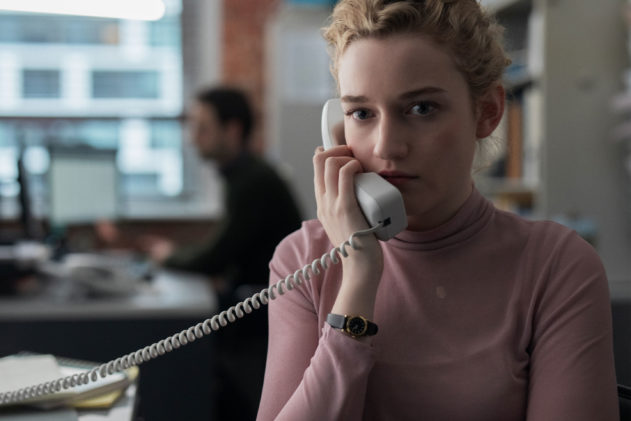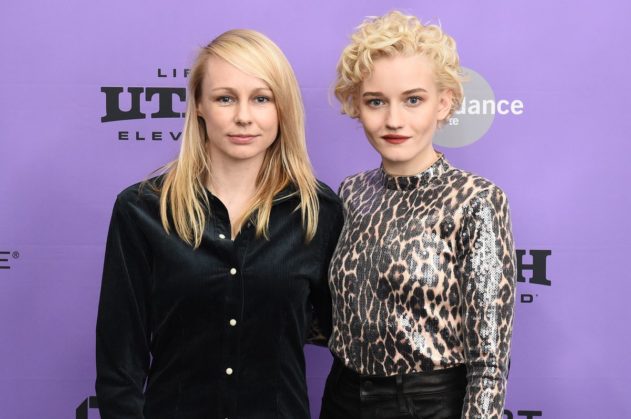INTERVIEW: “We got a lot of work to do” (The Assistant” director KITTY GREEN)
Much like Jane, the never-named hero of her film “The Assistant,” writer-director Kitty Green began her career in media at a production company. She wanted to be in the film business, where starting off at the bottom was the typical first step to where she now finds herself after years of hard work.
Green, who is Australian, screened “The Assistant” at Sundance, and sat down with me in Washington, D.C., this past Friday to discuss the similarities and differences between herself and young Jane, played in the film by Julia Garner (“Ozark”).
“I worked as an assistant, but it was in a post-production facility. So I do know what it’s like to be the youngest woman in the office and quite ambitious—but unsure that I fit in,” Green said. “Or if there is a path for me there.”
In “The Assistant,” Jane arrives at her New York office well before dawn and sets about making copies, brewing coffee and placing documents on desks for still-sleeping executives (unlike Green herself, who worked in post, fictional Jane’s job is in a production office.) When her coworkers do arrive, they are dismissive of her at best—even her female coworkers.
“This film is more about gendered work environments,” Green told me. “A lot of it comes from anger at things people have said to me over the years.”
“The Assistant” is shot minimally, without fancy camera moves or tricky editing. There is no musical score except over the beginning and end credits. Yes, Green said, this was partly a necessity thanks to the brisk eighteen-day shooting schedule, but this also served to put the audience into Jane’s shoes as her one day is portrayed over 75 minutes of screen time. Green populates the world around Jane with a bounteous array of New York stage actors, who run away with their brief, often-muted roles as her coworkers.
“I wanted it to be an authentic portrait of a young woman in that position that really stuck you in her shoes and forces you to go through her day with her, almost in excruciating detail,” Green said. “I was saying to my cinematographer [Michael Latham, that] if there were any crazy camera moves or weird angles, it would almost work against us because we were trying to show how cool we were as opposed to focusing on [Jane] and making it a very honest and delicate portrait.”
As Jane’s day unfolds, she is asked to escort a new admin to a swanky Midtown hotel, where she will be joined shortly by Jane’s boss, the faceless entertainment exec who “discovered” her. The film thus hinges on Jane and the strength of her moral compass. She knows this is inappropriate (there are office “jokes,” even among the women, that it has happened many times before with the same exec) but will she do something about it?
It’s easy to say “yes” in 2020, Green believes, in the wake of the #MeToo movement. Which is why she purposely set “The Assistant” at an indeterminate point in the preceding decade before the fall of Harvey Weinstein.
“I would say that if it were set [in 2020], I think [Jane] would have more language to describe what they’re seeing or at least have an avenue to report it,” said Green. “Even take to Twitter or contact a journalist.
“But when it’s set ‘pre-then,’ I don’t think there were many options. People didn’t know what to do with that kind of information. What do I do and where do I take it?”
In a film filled with tension and harrowing scenes, the most singularly painful is the one where Jane does bring her concerns to human resources—where, naturally, her inquisitor is male. How and why this scene unfolds I wouldn’t dream of revealing, but Green believes that when the film ends, audiences will leave discussing not only this particular scene but an overarching culture that has kept women “out of power.”
“We need to think through our choices and our behavior, and think about how we can make our workplaces safer and more equitable,” she said, adding that at several screenings, supervisors from various industries have approached her to say they would make a concerted effort to treat their own employees better.
“I think it’s having an impact, which is good,” Green said.
However, the film industry continues to be a boys club, as do many other workplaces where the bro culture shown in “The Assistant” is not only tolerated but actively encouraged.
“It seems like [some people] think that this behavior is OK…so you feel there’s something wrong with you if you don’t stick it out,” Green said. “It’s dehumanizing in a way. And a lot of these environments are very competitive and very cutthroat [so] you end up in a situation you don’t want to be in.”
But Green says that perceptions are slowly changing and consciousness being raised, in part due to a greater cultural understanding.
“I’ve seen a bit of a shift even in the way people treat me as a female filmmaker,” she said. “But there’s still a lot of behaviors depicted in the film that [remain] in place.”
This includes an often-dismissive attitude Green says she has received from male journalists, who say that Jane’s office mates are “just trying to help her out.”
“A lot of women get really angry at that. Some people still don’t realize when they’re being patronizing and condescending,” Green said. “We got a lot of work to do.”
“The Assistant” is now playing in select theaters.
news via inbox
Nulla turp dis cursus. Integer liberos euismod pretium faucibua




